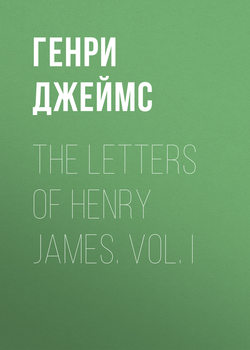Читать книгу The Letters of Henry James. Vol. I - Генри Джеймс, Henry Foss James - Страница 6
I
FIRST EUROPEAN YEARS (1869-74)
To his Mother
ОглавлениеFlorence, Hôtel de l'Europe.
October 13th, 1869.
My darling Mammy,
For the past six weeks that I have been in Italy I've hardly until within a day or two exchanged five minutes' talk with any one but the servants in the hotels and the custodians in the churches. As far as meeting people is concerned, I've not as yet had in Europe a very brilliant record. Yesterday I met at the Uffizi Miss Anna Vernon of Newport and her friend Mrs. Carter, with whom I had some discourse; and on the same morning I fell in with a somewhat seedy and sickly American, who seemed to be doing the gallery with an awful minuteness, and who after some conversation proposed to come and see me. He called this morning and has just left; but he seems a vague and feeble brother and I anticipate no wondrous joy from his acquaintance. The 'hardly' in the clause above is meant to admit two or three Englishmen with whom I have been thrown for a few hours.... One especially, whom I met at Verona, won my affections so rapidly that I was really sad at losing him. But he has vanished, leaving only a delightful impression and not even a name—a man of about 38, with a sort of quiet perfection of English virtue about him, such as I have rarely found in another. Willy asked me in one of his recent letters for an 'opinion' of the English, which I haven't yet had time to give—tho' at times I have felt as if it were a theme on which I could write from a full mind. In fact, however, I have very little right to have any opinion on the matter. I've seen far too few specimens and those too superficially. The only thing I'm certain about is that I like them—like them heartily. W. asked if as individuals they 'kill' the individual American. To this I would say that the Englishmen I have met not only kill, but bury in unfathomable depths, the Americans I have met. A set of people less framed to provoke national self-complacency than the latter it would be hard to imagine. There is but one word to use in regard to them—vulgar, vulgar, vulgar. Their ignorance—their stingy, defiant, grudging attitude towards everything European—their perpetual reference of all things to some American standard or precedent which exists only in their own unscrupulous wind-bags—and then our unhappy poverty of voice, of speech and of physiognomy—these things glare at you hideously. On the other hand, we seem a people of character, we seem to have energy, capacity and intellectual stuff in ample measure. What I have pointed at as our vices are the elements of the modern man with culture quite left out. It's the absolute and incredible lack of culture that strikes you in common travelling Americans. The pleasantness of the English, on the other side, comes in a great measure from the fact of their each having been dipped into the crucible, which gives them a sort of coating of comely varnish and colour. They have been smoothed and polished by mutual social attrition. They have manners and a language. We lack both, but particularly the latter. I have seen very 'nasty' Britons, certainly, but as a rule they are such as to cause your heart to warm to them. The women are at once better and worse than the men. Occasionally they are hard, flat, and greasy and dowdy to downright repulsiveness; but frequently they have a modest, matronly charm which is the perfection of womanishness and which makes Italian and Frenchwomen—and to a certain extent even our own—seem like a species of feverish highly-developed invalids. You see Englishmen, here in Italy, to a particularly good advantage. In the midst of these false and beautiful Italians they glow with the light of the great fact, that after all they love a bath-tub and they hate a lie.
16th, Sunday. I have seen some nice Americans and I still love my country. I have called upon Mrs. Huntington and her two daughters—late of Cambridge—whom I met in Switzerland and who have an apartment here. The daughters more than reconcile me to the shrill-voiced sirens of New England's rock-bound coast. The youngest is delightfully beautiful and sweet—and the elder delightfully sweet and plain—with a plainness qui vaut bien des beautés....
Maman de mon âme, farewell. I have kept my letter three days, hoping for news from home. I hope you are not paying me back for that silence of six weeks ago. Blessings on your universal heads.
Thy lone and loving exile,
H. J. jr.
